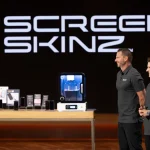
Ellie Brown and Becca Nelson are two sisters who came to the Shark Tank with a creative streak. They had found a playful way to turn plain shirts into something people actually get excited about.
Their business, called evREwares, was of designer reusable fabric stickers that could stick right onto a simple tee. The stickers came in several fancy colors and themes, so anyone can switch up their look without buying a new outfit every time they head to a party.
The business was conceptualized in 2011 when the sisters were looking for an easy way to refresh their kids’ clothing without spending much. They started crafting reusable stick-on pieces in many playful looks, such as tie shapes, bow shapes, and a wide range of themed accents.
As their playful designs caught attention, the business expanded into boutiques and online stores.
The idea spread quickly, and people loved how simple it was to update a shirt. Their growing presence in shops and online had generated approximately $600,000 in lifetime sales by 2015.
evREwares Shark Tank Recap
The two sisters took their product to Season 6 Episode 7 of Shark Tank and asked the investors for $100,000 in return for 30% of the company.
The pitch took a turn once they mentioned they expected only $50,000 in profit by the end of the year and planned to slow down afterward to rethink how they were running things. The investors worried that this signaled a lack of momentum and commitment.
The Sharks did not have soft words when they heard the numbers. Each reusable fabric sticker was selling for between $5 and $8, which felt far too high to them.
Founders Ellie and Becca explained that each one cost about fifty cents to produce, but that did not calm the room.
Kevin O’Leary was particularly enraged and called their product the costliest stickers he had ever seen in the market. He went on to call out the product, saying, “This idea sucks. This is a howling dog from hell, and I am out.”
Barbara Corcoran also pointed out her concern by saying how the founders had an eye for design but not for business.
Sharks Hated The Idea, But Mark Cuban Offered 200K
The sisters pleaded for business help from the Sharks to almost no avail. One by one, (almost) all the Sharks went out, criticizing the business and its model.
Mark Cuban smelled the desperate call for help from the founders and ended up making an offer. He offered $200,000 for the ENTIRE business. All the Sharks exclaimed at him.
Lori Greiner even said, “Mark, it is a tough business,” in an attempt to make him not go ahead with the deal. Lori and Barbara showed a sense of sympathy for the founding duo as they were devastated by where the business was headed.
After accepting the bitter truth that they had the designing chops but not the business acumen, the sisters, albeit heartbroken, decided to take up Mark’s offer.
Was this a sympathetic moment of philanthropy or a capitalistic moment of capturing a beaten-down horse?
What Happened After The Shark Tank Appearance
The deal the sisters shook hands on with Mark Cuban during their episode of Shark Tank never made it past the follow-up stage. Ellie Brown later explained to the Triangle Business Journal that handing over 100% equity of their whole company became tougher to digest once the stage jitters faded away.
She said the situation was unpredictable, and it was not something they were ready to do.
After their segment aired, the company got a short surge in sales. Their website was flooded with traffic. At one point, they were getting more than a thousand clicks every second. A classic example of the Shark Tank effect.
Unfortunately, the high ride did not last long. Even with limited-time deals, only about $10,000 in extra sales came through.
In a sad but foreseen turn of events, evREwares ceased to operate sometime around the end of 2015.
Why The Business Stumbled After a Bright Start
evREwares story feels less like a failure and more like a wild learning curve that moved faster than they ever expected. Their idea had charm, it had personality, and it genuinely brought people some joy, albeit at a hefty price point.
And as seen on the show, the steep price point and limited business structure became long-term challenges.
The company lacked structure, support, and a business-minded vision. They needed professional support to keep growing once the spotlight faded, which they did not get. The sisters’ business got swept up in something larger than they planned for.





















Great post — I found the examples really helpful. Thanks for sharing!